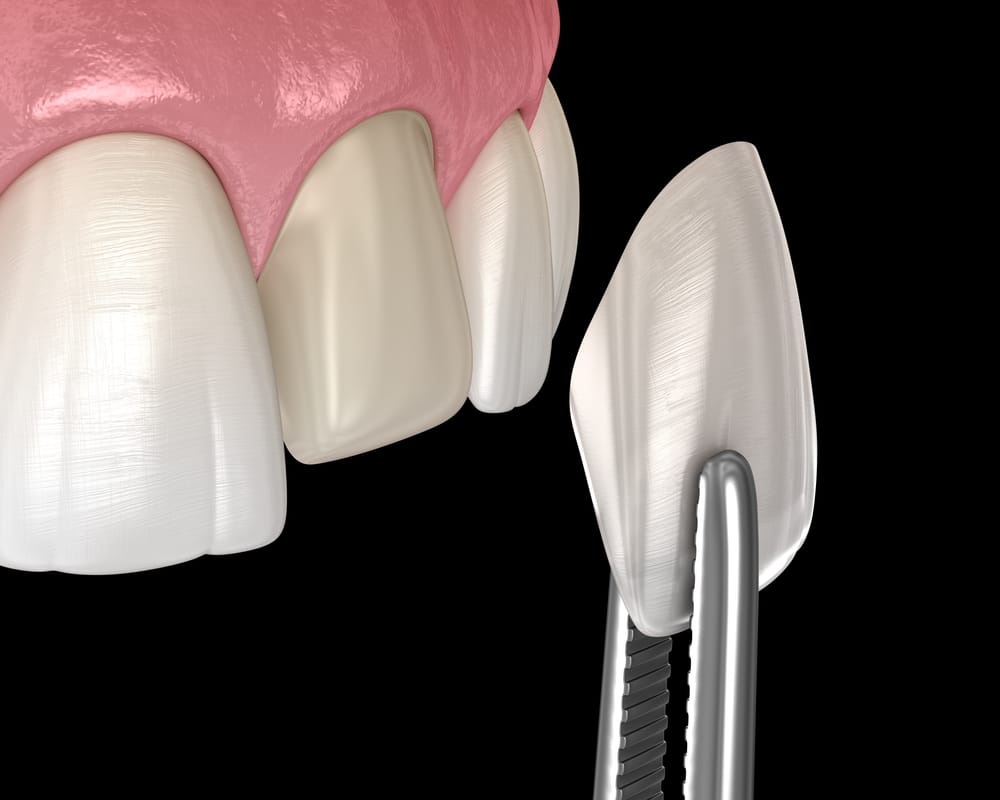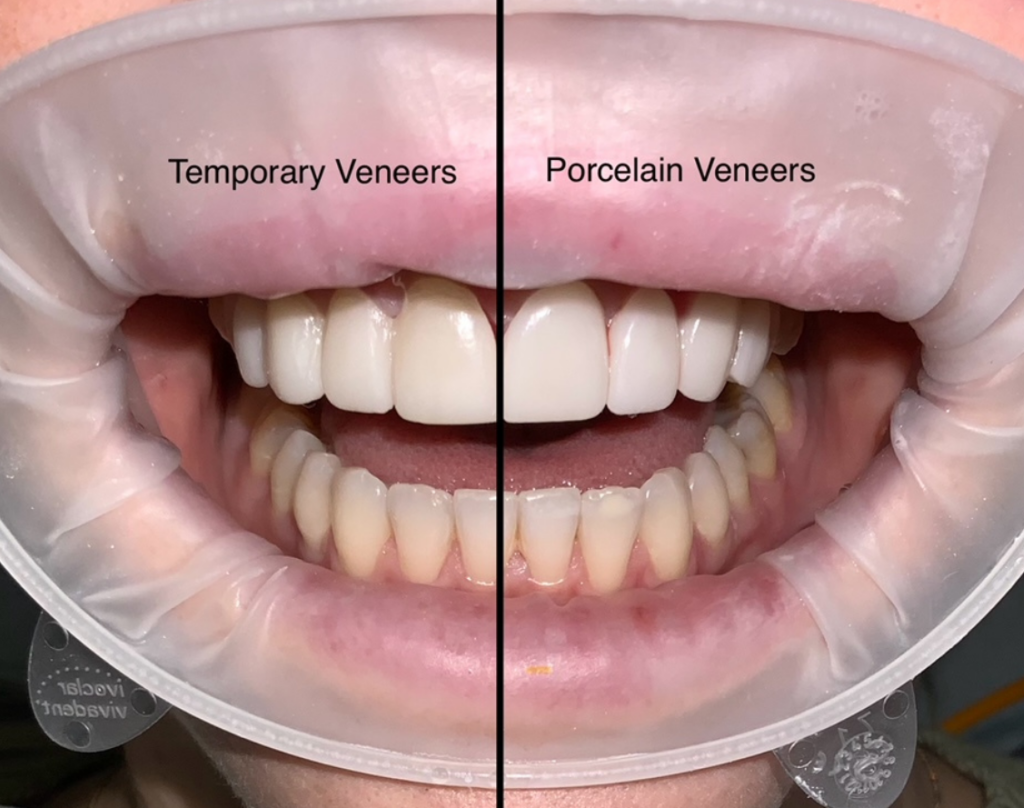Considering dental veneers to enhance your smile? Dental veneers are a popular cosmetic dental treatment designed to significantly improve the appearance of your teeth. They effectively address issues such as:
- Discoloration
- Chips
- Gaps
- Misalignment
Before proceeding with this treatment, it’s crucial to understand the dental veneer procedure and what you can expect throughout each step. This comprehensive guide will provide an overview of the entire process—from your initial consultation to the final placement of your veneers—ensuring you feel informed and prepared for a successful outcome.
What Are Dental Veneers?
Dental veneers are thin, custom-made shells that cover the front surface of your teeth. Typically crafted from porcelain or composite resin, these veneers are designed to closely mimic the natural appearance of your teeth. They are an excellent option for individuals looking to enhance their smile’s aesthetics, addressing various cosmetic concerns such as:
- Discolored or stained teeth
- Chipped or cracked teeth
- Gaps or spacing issues
- Misshapen or irregularly shaped teeth
- Minor misalignment or crowding
By bonding these shells to the front of your teeth, dental veneers can create a uniform, beautiful, and natural-looking smile that boosts your confidence and enhances your overall appearance.

It’s important to note that while most dental veneers are permanent due to enamel removal during placement, some options like no-prep veneers may be reversible. With proper care—such as regular brushing, flossing, and dental visits—veneers can last between 10 to 15 years. However, some patients may experience temporary tooth sensitivity following placement. Always consult with your dentist to determine if veneers are right for you and to discuss any potential risks.
The Dental Veneer Procedure: A Comprehensive Guide

Getting dental veneers is a transformative process that typically involves multiple steps and visits to your dentist. Here’s a detailed breakdown of what to expect:
1. Initial Consultation
Your journey begins with an initial consultation. During this visit, your dentist will assess your oral health, including checking for cavities or gum disease, which are essential factors in determining if veneers are suitable for you. Diagnostic tools like X-rays, impressions, or digital scans may be used to evaluate your teeth and gums.
Your dentist will also explain the types of veneers available—porcelain or composite resin—and guide you in selecting the material that aligns with your needs and budget. If necessary, they’ll discuss tooth preparation, which involves removing a small amount of enamel to ensure a perfect fit.
2. Tooth Preparation (If Required)
If preparation is needed, your dentist will gently remove a thin layer of enamel—typically between 0.3 to 0.7 millimeters—from the tooth surface. This step is essential for achieving a natural look and proper fit but is irreversible.
After preparation, impressions or digital scans are taken to create a precise mold of your teeth. These are sent to a dental lab where your custom veneers are crafted.
3. Temporary Veneers (Optional)
While waiting for your permanent veneers, your dentist may provide temporary ones to protect your prepared teeth and offer a preview of the final result.
4. Veneer Fabrication
At the dental lab, skilled technicians meticulously design your veneers to match your desired shade and shape. This process can take several days or weeks depending on the complexity of your case.
5. Veneer Placement
Once ready, your dentist will remove any temporary veneers and prepare your teeth for bonding using a special adhesive. Each veneer is carefully positioned on your teeth; then a curing light is used to harden the adhesive quickly.
6. Final Adjustments and Polishing
After bonding, your dentist will make final adjustments for comfort and bite alignment. The veneers are polished to achieve a natural finish that seamlessly integrates with your smile.
By following these steps, you can achieve a stunning smile transformation while being aware of the importance of maintaining good oral health throughout the process.
Aftercare and Maintenance

To ensure the longevity and durability of your dental veneers, proper care and maintenance are crucial. Your dentist will provide specific aftercare instructions, which typically include:
Brush Twice Daily: Use a soft-bristled toothbrush and non-abrasive fluoride toothpaste to gently clean your veneers and natural teeth. This helps prevent plaque buildup while preserving the shine of your veneers.
Floss Daily: Flossing is essential for maintaining gum health and removing debris from between your teeth and around your veneers. Consider using a water flosser for effective cleaning.
Avoid Hard or Sticky Foods: Refrain from consuming hard or sticky foods that could chip or dislodge your veneers. Opt for softer alternatives to protect your investment.
Wear a Nightguard (if recommended): If you tend to grind or clench your teeth at night, wearing a nightguard can protect your veneers from excessive wear and tear.
Stay Hydrated: Drinking plenty of water helps maintain saliva production, which is vital for oral health and can aid in rinsing away food particles.
Regular Dental Check-ups: Schedule routine visits to your dentist for professional cleanings and assessments. Regular check-ups are vital for maintaining both your veneers’ integrity and your overall oral health.
By adhering to these guidelines, you can ensure that your dental veneers last between 10 to 15 years, providing you with a beautiful and confident smile while minimizing potential issues like discomfort or looseness.
Potential Risks and Considerations
While dental veneers are a widely recognized and effective cosmetic treatment, it is crucial to understand the associated risks and considerations to make an informed decision:
Tooth Sensitivity: Some individuals may experience temporary sensitivity to hot or cold temperatures following veneer placement. This discomfort usually resolves within a few weeks; however, using desensitizing toothpaste can help alleviate discomfort during this period.
Irreversible Procedure: The process of preparing teeth for veneers involves the permanent removal of a small amount of enamel. Once this step is taken, veneers or another form of restoration will be necessary to protect the teeth.
Durability and Care: Although veneers are designed to be durable, they are not immune to damage. Chipping or cracking can occur due to excessive force or habits like nail-biting or chewing on hard objects. Practicing good oral hygiene and avoiding risky behaviors can extend their lifespan.
Long-Term Risks: In addition to immediate concerns, patients should be aware of potential long-term risks such as veneer failure due to wear or decay, gum recession from improper fitting, and tooth damage during preparation. Consulting with a skilled dentist can mitigate these risks significantly.
Cost Considerations: Dental veneers represent a significant financial investment, typically ranging from $925 to $2,500 per tooth depending on various factors such as material type and geographic location. Discussing pricing and exploring financing options with your dentist is essential for planning effectively.
By understanding these factors, patients can better weigh the benefits and limitations of dental veneers, ensuring a choice that aligns with their needs and expectations.
Conclusion
Dental veneers are a popular and effective solution for enhancing the appearance of your smile. By understanding the dental veneer procedure and what to expect, you can make an informed decision and prepare yourself for a successful outcome. Remember to communicate openly with your dentist, follow their instructions for care and maintenance, and be patient throughout the process. With the right approach and care, your new veneers can provide you with a beautiful, confident smile for years to come.
Dental veneers serve both cosmetic and functional purposes. They can correct a variety of dental issues, including discoloration, gaps, and misaligned teeth, enhancing the appearance of your smile. They also protect the surface of damaged teeth and may eliminate the need for more extensive treatments.
The process for dental veneers involves several steps, including an initial consultation, tooth preparation, shade selection and impression, bonding, and a follow-up visit.
Dental veneers are applied in a multi-step process that begins with tooth preparation, where a small amount of tooth enamel is removed. An impression of your teeth is then taken and used to create your custom veneers. The veneers are then bonded to your teeth using a special adhesive.
The veneer procedure is typically not painful. Local anesthesia is used during the tooth preparation stage to ensure comfort. Some sensitivity may be experienced after the procedure, but this usually subsides within a few days.
Dental veneers can be a worthwhile investment for those seeking to enhance their smile. They offer a long-lasting solution to a variety of dental imperfections and can boost confidence. However, it’s important to discuss this option with a skilled dentist to ensure it’s the right choice for you.







